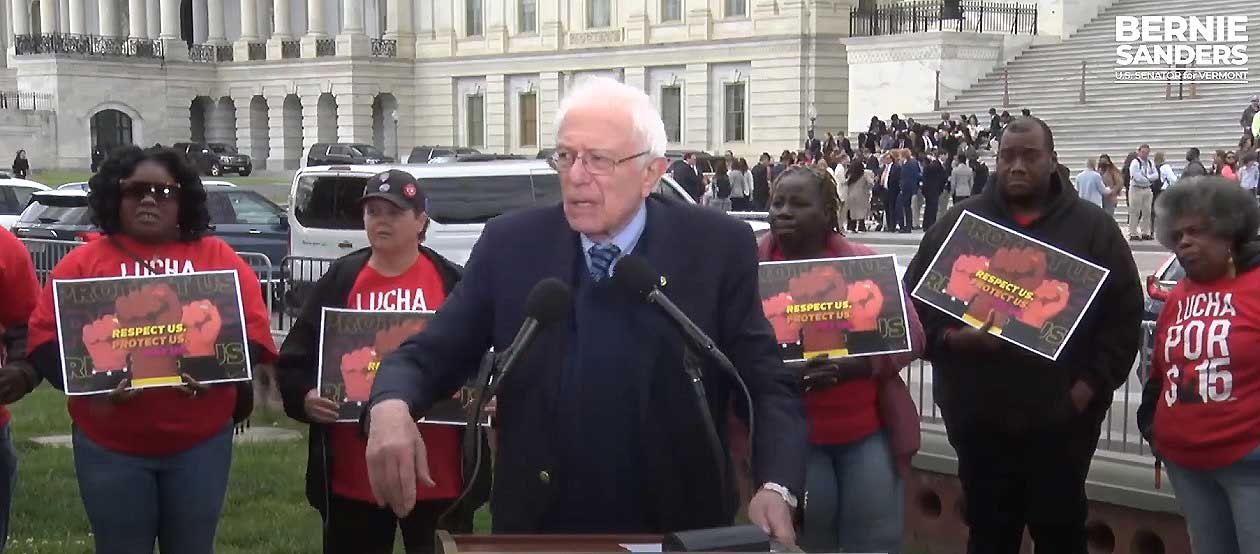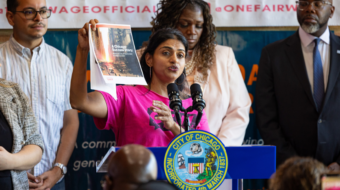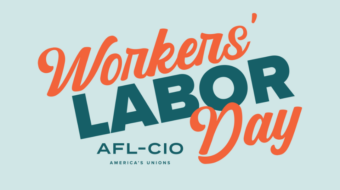
WASHINGTON—With strong union support—and a phalanx of low-wage workers of color backing him—Senate Labor Committee Chairman Bernie Sanders, Ind-Vt., formally introduced his legislation raising the federal minimum wage to $17 an hour over five years.
Though Sanders promised the panel will advance the legislation on May 14, getting it beyond that may be tough—which is where the workers, the AFL-CIO and the Service Employees, represented by Presidents Liz Shuler and Mary Kay Henry, come into the picture.
That’s because both said, in interviews after Sanders’ Capitol Hill May 4 outdoor press conference, that organized labor will put pressure on lawmakers to approve the increase, overcoming expected corporate and Republican opposition.
If enacted, Sanders’s legislation would be the first minimum wage hike law since 2007. That increase stretched through 2009, to the current federal minimum, $7.25.
“In the year 2023, in the richest country in the history of the world, nobody should have to be working for starvation wages,” Sanders, workers’ longest, strongest congressional supporter, stated. “Maybe, just maybe, working people deserve to afford a damn hamburger.”
Workers at the press conference welcomed his increase, as both the senator and other speakers pointed out that the current $7.25 hourly isn’t enough to live on. That level also hurts the economy by dragging low-wage workers down, said Economic Policy Institute President Heidi Shierholz.
The low-wage workers would spend the minimum wage increase on basics, like food, rent, and health care, benefiting other workers, she explained. Meanwhile the rich expand the wage and wealth gap—and sock their money away or spend it on “billionaires’ rockets,” Shuler added.
Disproportionate shares of those low-wage and minimum-wage workers are people of color, working women, and living in the South and other “red” states, speakers noted. Even voters in those states, given the choice at the ballot box, raise minimum wages, Sanders said.
Voters want a big increase
Nebraska did so, to $15, by a 60% vote last year, he noted. But white Republican legislatures in red states veto “blue” cities’ attempts to follow that lead. Sanders’s bill calls for a raise to a $17 minimum, spread over five years because $17 an hour now equals $15 when he last tried to raise the wage, two years ago. Democratic Senate defections led to that loss.
“I’m here to bring the voices of 12 and a half million workers and 60 unions to this fight,” said Shuler. “I travel this country, talking to working people,” and the minimum wage workers she meets “are dishwashers, health care workers, Walmart greeters” and their colleagues.
“They tell me, ‘I can’t afford food.’ ‘I can’t go to the doctor.’ ‘I might be evicted because I can’t pay the rent’” while earning $7.25 an hour, even if they often work at two or three low-paying jobs. Raising the federal minimum wage to $15 hourly “is not radical.”
“We asked workers at a big summit last week” of low-wage workers how they would react to a minimum wage hike, Shuler added. “’I would quit my second job.’ ‘I would quit my third job.’ ‘I would spend more time with my family,’” were among the replies.
Mama Cookie Bradley of Eutawville, S.C. agreed. One of several workers at the press conference, she explained that after 30 years in South Carolina at minimum wage jobs at McDonald’s and Dollar General, she finally got a job paying $15 an hour. But it’s in Charleston, an hour-and-a-half one-way drive from Eutawville for Bradley, 64.
South Carolina is one of a phalanx of “red” states which refuse to raise their own minimum wages. In some, notably Alabama, right-wing Republican state lawmakers, beholden to the low-wage fast-food and restaurant industry, block their “blue” cities from hiking their own minimum wages, by nullifying city authority to enact pro-worker laws.
With a pattern like that, “That’s why we need a federal minimum wage” increase, said Sanders.
The workers laid out the case for how raising the minimum wage would help them and their families, and Economic Policy Institute President Heidi Shierholz made the case economically for both the workers and the economy.
Henry, Shuler, and SEIU Legislative Director John Gray discussed in follow-up interviews how to get the minimum wage hike past corporate and Republican opposition. And while he did not issue a statement for the increase after the May 4 press conference, Democratic President Joe Biden supports the $15 minimum wage, too.
In January 2022, in announcing his $15 minimum for 70,000 federal workers and 300,000 more who told for federal contractors, Biden said all workers should earn at least $15. “I continue to urge Congress to raise the federal minimum wage to $15 an hour so that American workers can have a job that delivers dignity,” he said then.
Shuler said the labor movement would incorporate the minimum wage hike bill into its ongoing grass-roots political organizing “in all 50 states.” And unlike the past, she pointed out, labor is pushing grass-roots politics now, 365 days a year.
“You keep it connected to politics and mobilization,” she said of the minimum wage hike. “It’s an issue everybody understands.”
Henry and Gray said the threat of ballot box revenge may be the goad bringing over needed votes in the Republican-run House. She believes Speaker Kevin McCarthy, R-Calif., will hear from his members about overwhelming constituent support for raising the minimum wage, and retribution in November 2024 if they vote “no.” So they’ll vote “yes.”
“The idea is he’ll give them”—other Republicans—“a pass,” said Gray.
We hope you appreciated this article. At People’s World, we believe news and information should be free and accessible to all, but we need your help. Our journalism is free of corporate influence and paywalls because we are totally reader-supported. Only you, our readers and supporters, make this possible. If you enjoy reading People’s World and the stories we bring you, please support our work by donating or becoming a monthly sustainer today. Thank you!










